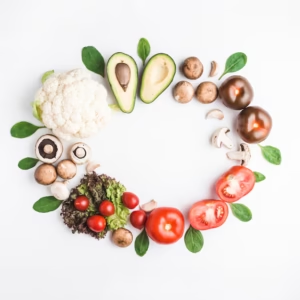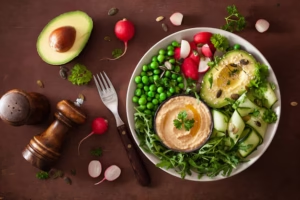
What is a Plant-Based Diet?
A plant-based diet primarily revolves around foods that come from plants—think fresh fruits, vegetables, whole grains, nuts, seeds, and legumes. The goal is to embrace natural, wholesome foods while minimizing or even eliminating animal products. It’s not as strict as veganism, meaning you can easily adapt it to fit your own preferences and lifestyle.
For example, you can enjoy a hearty plate of rajma chawal, a light yet filling bowl of poha, or a refreshing mixed fruit salad—all delicious, nutritious, and guilt-free! The beauty of a plant-based diet lies in its flexibility, allowing you to explore a variety of tasty options while focusing on your health and well-being.
Why Should You Start a Plant-Based Diet?

Before you just start a plant-based diet, ask yourself: Why are you making this change? Is it to get fitter, lose those extra kilos, or maybe you want to reduce your environmental footprint? Or perhaps you’re just curious to explore a healthier lifestyle? Whatever your reason, a plant-based diet offers numerous benefits that can change your life for the better. Even, a controlled study showed a lower risk of PCOS in young women’s health after they have switched to plant-based diet.
1. Health Benefits
• Heart Health: Research shows that people who follow a plant-based diet tend to have lower cholesterol levels and a significantly healthier heart. The good fats and nutrients in plant foods help reduce the risk of heart disease.
• Weight Loss: Plant-based foods are typically low in calories and high in fibre, which makes it easier to manage your weight without feeling deprived.
• Reduced Risk of Disease: A plant-based diet is linked to a lower risk of diseases like diabetes, hypertension, and even certain cancers. It supports long-term health by boosting your immune system and maintaining healthy body functions.
2. Environmental Impact
Plant-based khana na sirf aapke liye healthy hai, balki environment ke liye bhi achha hai (Switching to a plant-based diet is not just great for your health but also for the planet). It requires fewer natural resources—like water—and generates lower greenhouse gas emissions, making it an eco-friendly choice. So, you’re not just benefiting your body but also giving Mother Earth a little love!
3. Cost-Effective
A plant-based diet can also be easy on your wallet. Staples like dal, rice, seasonal vegetables, and fruits are far more affordable compared to meat or dairy. So, you can eat healthy without breaking the bank!
Read Also: Probiotics vs Prebiotics Benefits: Know the Difference Before It’s Too Late!
How to Start Your Plant-Based Journey?

Now let’s talk about the start—how do you begin? Transitioning to a plant-based diet doesn’t have to be overwhelming. Start with small, manageable changes and gradually build a routine. Yeh gradual shift aapko feel nahi hoga, aur aapko apne naye diet mein comfort milega.
1. Make Small Swaps
It’s not necessary to change everything at once. Begin by swapping just one meal a day with a plant-based alternative. It will help you ease into the transition. For example:
- Breakfast: Try oats with almond milk and fruits instead of parathas.
- Lunch: Veg pulao or dal and sabzi is a great option.
- Dinner: A hearty vegetable soup or stir-fry with tofu is a perfect, filling choice.
2. Learn About Nutrition
You need every nutrient, and a plant-based diet should be complete too. Make sure you focus on the essentials
- Protein: Rajma, chana, tofu, soya chunks, and dals are great plant-based protein sources.
- Calcium: Almonds, sesame seeds, spinach, or fortified plant milk will keep your bones strong.
- Vitamin B12: You’ll need to get this from supplements or fortified foods, as it’s essential for your health.
3. Stock Your Kitchen
Your kitchen should be ready for this shift! Stock up on whole grains, pulses, nuts, fresh veggies, and a few key spices. These items will help make every meal tasty and nutritious.
4. Experiment with Recipes
Cooking at home is the best way to make sure you stay on track with your plant-based journey. Start experimenting with simple and delicious recipes. Try:
- Besan cheela with chutney
- Chole and whole wheat roti
- Tofu bhurji instead of egg bhurji
5. Plan Your Meals
Meal prep is your best friend when it comes to consistency. You can chop veggies in advance to save time. Soak your dals overnight, or cook in batches to have ready meals throughout the week. Yeh planning aapko stress-free aur healthy banaye rakhegi (This planning will keep you stress-free and healthy).
Also Read: Best Foods for Gut Health: Must-Have Superfoods for a Happy Gut
You can quickly watch this video to learn more:
How to Overcome “Normal” Challenges in a Plant-based Diet?
Starting anything new comes with hurdles. Don’t worry, we’ve got your back! Switching to a plant-based diet might seem tough at first, but with a little planning, it’s easier than you think.
- Worried About Protein?
Focus on lentils, beans, and nuts—India has so many options! Rajma, chana, moong dal, and even soya chunks are rich in protein. These will fulfil your muscle-building needs.
- Missing Favourite Dishes?
Make plant-based versions of them. Craving butter chicken? Try tofu in a cashew-based gravy. You won’t have to compromise on taste. You can easily recreate your favourite dishes with plant-based ingredients.
- Eating Out?
Most Indian restaurants have plenty of vegetarian options—just skip the paneer if you want to go fully plant-based. You can ask for tofu or other veggie-based alternatives instead. Plus, many places are now more open to customising their dishes as per your diet. Just a little communication goes a long way!
Switching to plant-based might have its challenges, but with the right mindset and tips, it’ll soon feel like second nature. Keep going, and you’ll be amazed at how smoothly the transition goes!
Dos and Don’ts of a Plant-Based Diet

Dos:
• Choose seasonal and locally sourced ingredients—they are more nutritious and flavourful. Seasonal veggies and fruits are packed with more vitamins and minerals. Plus, local produce supports small farmers and is eco-friendly!
• Focus on whole foods instead of packaged ones. Whole grains, legumes, fresh fruits, and veggies should be your go-to. Packaged foods might be convenient, but they often contain preservatives, added sugars, or too much salt, which aren’t ideal for a healthy plant-based lifestyle.
• Stay hydrated—fibre-rich foods need water to digest properly. Drinking water is crucial for proper digestion, especially when you’re eating more fibre. Keep a water bottle handy throughout the day to stay on top of hydration.
Don’ts:
• Don’t rely too much on processed plant-based substitutes like fake meat or sugary snacks. While plant-based versions of your favourite snacks or meats are great sometimes, eating too many processed foods can make your diet less healthy. Stick to whole foods as much as possible!
• Avoid skipping meals—you’ll end up feeling tired, cranky, or low on energy. Planning your meals ahead and having healthy snacks ready can help you stay on track. This way, you can maintain your energy levels.
Plant-Based Diet Tips for Long-Term Success
- Be Patient with Yourself: It’s okay to make mistakes. Focus on progress, not perfection.
- Track Your Journey: Note how your energy levels and overall health improve.
- Build a Support System: Join plant-based communities online for tips and motivation.
Also Read: Plant-Based Food Diet List: Your Ultimate Guide to Healthy Eating
Conclusion

Starting a plant-based diet is like taking a step towards a healthier, happier you. It’s not just about food, but a whole lifestyle shift that benefits both your body and the planet. By making mindful food choices, you’re nourishing yourself and reducing your carbon footprint. Remember, it’s a journey, not a race.
Take it one step at a time—start by making small changes, experimenting with new recipes, and gradually finding what works best for you. Whether you’re enjoying a wholesome vegetable stir-fry or trying a new lentil curry, the key is to enjoy the process and learn along the way. Don’t be too hard on yourself—just stay committed and embrace the new habits. Shuru karo aaj hi—your plant-based journey awaits! With every meal, you’re taking another step towards a vibrant, fulfilling life.
FAQs
- Do I need to quit dairy completely?
Not necessarily. You can limit dairy or replace it with alternatives like almond or soy milk. There are plenty of plant-based milk options available in the market. - Is it affordable?
Absolutely! Staples like dal, rice, and veggies are budget-friendly and nutritious. Seasonal fruits and vegetables are cost-effective too! - Will I get enough protein?
Yes! Indian kitchens are packed with protein sources like dals, legumes, and even soya chunks. Tofu, tempeh, and seitan are also great alternatives. - Can I enjoy Indian street food on a plant-based diet?
Yes, you can! There are plenty of plant-based street food options like pav bhaji, aloo tikki, and bhel puri. Just skip the dairy toppings! - Will I feel hungry all the time?
Not at all! Plant-based foods like whole grains, legumes, and vegetables are full of fibre, which keeps you full longer and aids in digestion.






